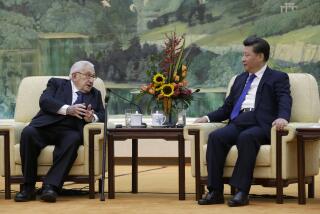Senate Ratification of Arms Treaty Called Vital : Nixon, Kissinger, Scowcroft Say Rejection of Missile Deal Would Divide Allies
- Share via
WASHINGTON — Despite their misgivings about a U.S.-Soviet treaty to ban ground-launched intermediate-range nuclear weapons, former President Richard M. Nixon and former National Security Advisers Henry A. Kissinger and Brent Scowcroft all fear that Senate failure to ratify the pact would be a mistake that would divide the European allies, Scowcroft said Friday.
“It would result in a complete traumatization of our allies,” he said at a breakfast session with reporters.
All three former officials, who are among the nation’s most experienced and knowledgeable figures in foreign policy, have criticized the treaty as it now stands and have declared that it should be linked to eliminating the Soviets’ overwhelming advantage in non-nuclear forces.
Otherwise, they have warned, a reduction in nuclear forces could make Western Europe vulnerable to the Soviets’ superior strength in conventional forces.
Nevertheless, they believe that the Senate should ratify the Intermediate Nuclear Forces (INF) treaty if President Reagan and Soviet leader Mikhail S. Gorbachev sign it as expected at their summit meeting in Washington on Dec. 7-10, Scowcroft said.
Failure to ratify would demonstrate to the allies that the United States not only had been “not too smart” in negotiating a treaty that eliminates weapons that have been a major element of stability in Europe, he said, but also that Washington “is unable to live up to an agreement” once it has been negotiated.
That would be “a very serious development,” said Scowcroft, a former Nixon adviser who served as President Gerald R. Ford’s national security adviser. He also served Reagan as a member of the presidential commission that investigated the Iran-Contra scandal and as head of a bipartisan commission on the MX strategic missile.
Shared View
In answer to a question, Scowcroft said that Nixon and Kissinger, as well as former Under Secretary of State Lawrence S. Eagleburger, who also has criticized the treaty as destabilizing, all share his views.
Nixon, who was reported to be busy working on a book, was unavailable for comment. Commenting through a spokesman, Kissinger, who was traveling, said he agrees that Senate failure to ratify the treaty would be a mistake that would divide the allies, though he added that he would not use the term “complete traumatization.”
Nixon and Kissinger, in a jointly authored article in The Times on April 26, issued an extraordinary warning to Reagan that it would be “a profound mistake” to sign a nuclear arms reduction agreement unless Moscow accepted major changes in the formula then being negotiated.
They insisted that the withdrawal of intermediate-range nuclear weapons from Europe should be linked to eliminating the Soviets’ advantage in conventional weapons.
At the time, Reagan Administration officials said their goal also was to provide for elimination of all such missiles worldwide, but they said they believed that insisting on a reduction in Soviet conventional forces would kill any chance of reaching agreement on the treaty, and they never pressed for the provision.
The Soviets eventually agreed to eliminate all intermediate-range missiles, including those in Asia, but no agreement has been reached on conventional forces.
Meanwhile, State Department spokesman Charles Redman announced that Secretary of State George P. Shultz and Soviet Foreign Minister Eduard A. Shevardnadze hope to complete plans for the summit at a meeting in Geneva on Monday and Tuesday.
“The chances are no doubt very good that the final questions (over the mid-range missile treaty) will be wrapped up” during the meeting, Redman said.
Redman said that Shultz and Shevardnadze would discuss the entire superpower agenda, including the strategic arms reduction talks. He sought to discourage speculation that the meeting was scheduled to break an impasse that threatened to scuttle the summit.
During the breakfast interview, Scowcroft predicted that the Senate would approve the INF treaty by the necessary two-thirds vote and estimated that only 20 to 25 senators now oppose ratification.
Eventually, he said, the outcome could depend on Senate Minority Leader Bob Dole (R-Kan.), who has said that he will remain uncommitted he has had a chance to study the completed treaty.
‘Cheerleader’ Bush
Among the other five candidates for the Republican presidential nomination, only Vice President George Bush has endorsed the treaty. The other GOP contenders have raised serious questions about it and have directly or indirectly criticized Bush for being a “cheerleader” for a treaty whose contents he has not yet studied.
Both Scowcroft and William E. Brock, Dole’s campaign chairman, said they believe that Dole will support ratification of the treaty.
Scowcroft described the INF treaty as “99% done” and suggested that the Soviets “will pay whatever they have to to make sure an agreement is concluded” in time for a signing ceremony at the Washington summit conference.
More to Read
Sign up for Essential California
The most important California stories and recommendations in your inbox every morning.
You may occasionally receive promotional content from the Los Angeles Times.













